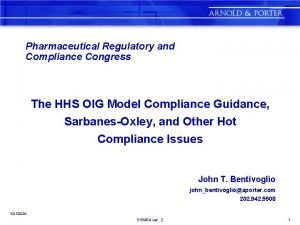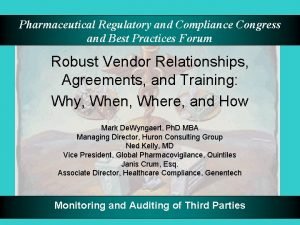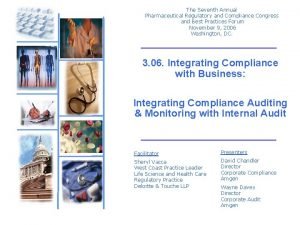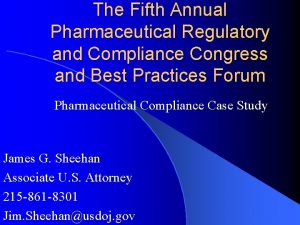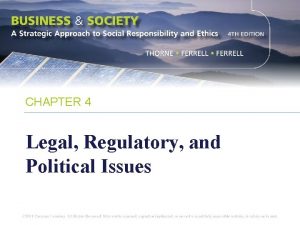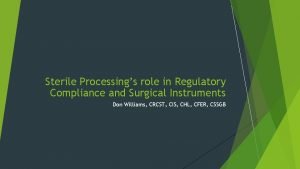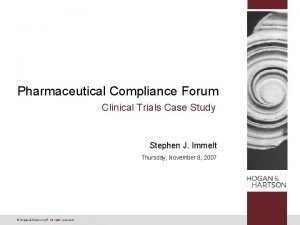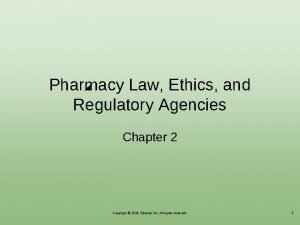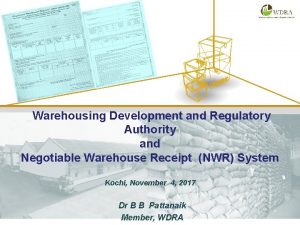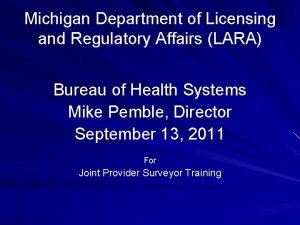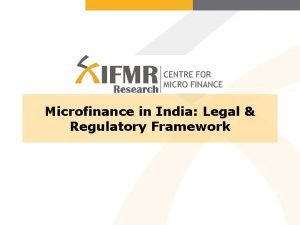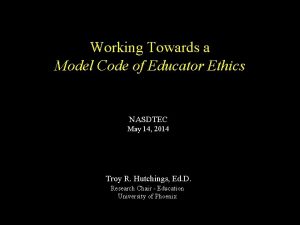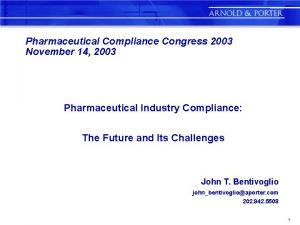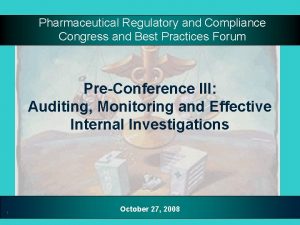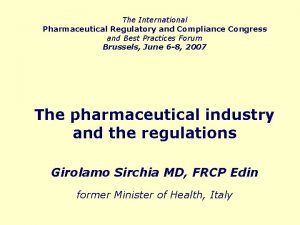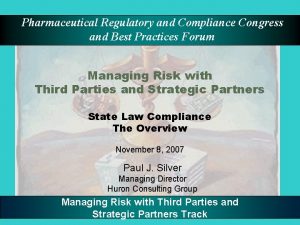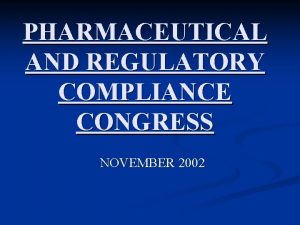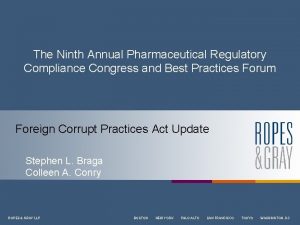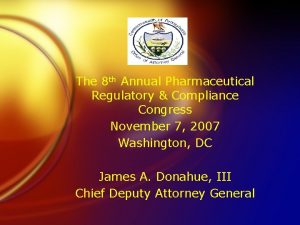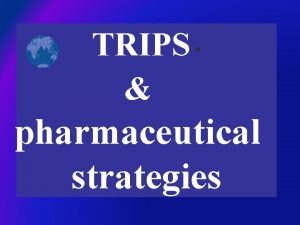Pharmaceutical Regulatory and Compliance Congress Compliance Issues and

















- Slides: 17

Pharmaceutical Regulatory and Compliance Congress Compliance Issues and Strategies for Clinical Research November 14, 2002 Heather J. Stewart, Esq. Porter Wright Morris & Arthur LLP

Topics to Cover • Ph. RMA Principles, Clinical Trials and Communication of Results (Effective October 1, 2002) • Kickbacks and Post-Marketing Studies

Ph. RMA Principles: Clinical Trials 1. Ensuring safety of research participants 2. Conduct of trials • Adherence to GCP world-wide, local laws and regulations • Ethical studies with scientific value and IRB/EC approval • Qualified and trained investigators • Documented informed consent

Ph. RMA Principles: Clinical Trials 2. Conduct of trials (continued) • Monitoring GCP compliance – Reporting scientific misconduct – Reporting safety issues • Privacy • Studies in developing world - collaboration with investigators and local authorities

Ph. RMA Principles: Clinical Trials 3. Objectivity • Independent data and safety monitoring board (no investigators, conflicts of interest) • Payments to research participants - IRB review, reasonable, informed consent • Investigators – – Reasonable compensation, no stock/options Written contract Not tied to outcome No direct ownership interest in drug

Ph. RMA Principles: Disclosure 4. Public disclosure of results • Communication – Marketed/Approved products – “Meaningful results” of controlled clinical trials – Exploratory studies: proprietary vs. significant medical importance – Access to information: Investigators, Participants and Journals

Ph. RMA Principles: Disclosure 4. Public disclosure of results (continued) • Results: objective, accurate, complete, balanced • Authorship: –Substantial contribution in study design, data acquisition or data analysis; –Writing/Revising manuscript; and –Final approval before submission.

Ph. RMA Principles: Clinical Trials and Communication of Results 4. Public disclosure of results (continued) • Sponsor review – Right to review pre-publication – No suppression or undue delay – Resolve differences through scientific debate

Kickback Risks and Clinical Research Anti-Kickback Statute, 42 USC § 1320 a-7 b(b) • Remuneration to induce/influence purchase, prescription or recommendation of any item for which payment may be made under Medicare, Medicaid, other Federal Health Care Program • Statute violated if inducement is “one purpose, ” U. S. v. Greber, 760 f. 2 d 68 (3 d Cir. 1985)

Kickback Risks and Clinical Research Anti-Kickback Statute, Personal Services Safe Harbor, 42 CFR § 1001. 952 • Commercially reasonable business purpose and necessary services • Written agreement spelling out all services • Fair market value - independent of business volume • Term of not less than one year

Kickback Risks and Clinical Research Post-marketing and pre-launch clinical studies: Elevated kickback risks • Science for promotion: Is it genuine research or a sham? • Practicing physicians as investigators: How are investigators selected and compensated?

Genuine Research vs. Sham Research • Adequate and well controlled studies” 21 CFR § 314. 126 – Protocol : objectives and analyses – Control comparison – Subject selection and randomization – Minimize bias, i. e. , blinding – Reliable methods of assessment – Analysis of study results to assess effects of the drug • Planned publication in peer review journal • Exploratory studies • “Seeding” or “Experience” study vs. – High numbers of investigators – Open label – Single arm – Minimal data collected – Excessive compensation – No publication • “Switching” studies

Investigators: Selection • Who Selects: research/operations or marketing? • Criteria: – Qualified to do research, follow GCP – Expertise in the relevant field – Potential to recruit eligible participants VS. – Key customers – “High Prescribers”

Investigators: Compensation • • • Written contract, spells out work to be performed Fair market value Payment for services performed (not volume of business) • Extra payments where enrollment is difficult – – In writing Specify purpose (advertising, keeping clinic open longer) No gift certificates, cash Other risks - ineligible patients, informed consent • Investigator meetings - reasonable expenses and location • Free drug vs. marketing the spread

End Product - What Happens When the Study is Done? Genuine Science: Sham Research: • Data analyzed • Results published in peer review journal • Used in promotion • Results from exploratory study used in future studies • No data analysis, study shoved in a drawer • Investigator prescribing habits analyzed pre-post study (“ROIs”) • No publication

Other Risks • • • False Claims Act Exploratory studies in promotion - misbranding Other criminal statutes – 18 USC § 371, Conspiracy to Defraud the Government – 18 USC § 1035, False Statements (in connection with payment for health care services) – 18 USC § 1347, Health Care Fraud (applies to public and private health programs) – 18 USC § 1518, Obstruction of Criminal Investigation of Health Care Offenses • State commercial bribery statutes and anti-kickback laws • Damage to reputation for quality research

Questions? ? ?
 Pharmaceutical regulatory and compliance congress
Pharmaceutical regulatory and compliance congress Pharmaceutical regulatory and compliance congress
Pharmaceutical regulatory and compliance congress Pharmaceutical regulatory and compliance congress
Pharmaceutical regulatory and compliance congress Pharmaceutical regulatory and compliance congress
Pharmaceutical regulatory and compliance congress Pharmaceutical compliance congress
Pharmaceutical compliance congress Pharmaceutical compliance congress
Pharmaceutical compliance congress Legal regulatory and political issues
Legal regulatory and political issues Cssd regulatory compliance
Cssd regulatory compliance Regulatory compliance
Regulatory compliance Pharmaceutical compliance forum
Pharmaceutical compliance forum Chapter 22 regulatory and advisory agencies
Chapter 22 regulatory and advisory agencies Dea number verification
Dea number verification Managing diversity and regulatory challenges
Managing diversity and regulatory challenges Warehouse regulatory and development authority
Warehouse regulatory and development authority Michigan department of licensing and regulatory affairs
Michigan department of licensing and regulatory affairs Legal and regulatory framework of microfinance in india
Legal and regulatory framework of microfinance in india Btec sport unit 3
Btec sport unit 3 Dispositional framework vs regulatory framework
Dispositional framework vs regulatory framework
